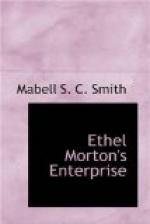Ethel Brown laughed.
“Let’s have a lecture,” she urged, “and,” handing her grandfather a small lump of coal, “here’s your text.”
Mr. Emerson turned the bit of coal over and over.
“When I look at this little piece of black stone,” he said, “I seem to see dense forests filled with luxuriant foliage and shrubbery and mammoth trees under which move sluggish streams draining the swampy ground. The air is damp and heavy and warm.”
“What about the animals?”
“There are few animals. Most of them are water creatures, though there are a few that can live on land and in the water, too, and in the latter part of the coal-making period enormous reptiles crawled over the wet floor of the forest. Life is easy in all this leafy splendor and so is death, but no eye of man is there to look upon it, no birds brighten the dense green of the trees, and the ferns and shrubs have no flowers as we know them. The air is heavy with carbon.”
“Where was the coal?”
“The coal wasn’t made yet. You know how the soil of the West Woods at home is deep with decayed leaves? Just imagine what soil would be if it were made by the decay of these huge trees and ferns! It became yards and yards deep and silt and water pressed it down and crushed from it almost all the elements except the carbon, and it was transformed into a mineral, and that mineral is coal.”
“Coal? Our coal?”
“Our coal. See the point of a fern leaf on this bit?” and he held out the piece of coal he had been holding. “That fern grew millions of years ago.”
“Isn’t it delicate and pretty!” exclaimed Ethel Blue, as it reached her in passing from hand to hand, “and also not as clean as it once was!” she added ruefully, looking at her fingers.
By way of preparation for their descent into the mine each member of the party was given a cap on which was fastened a small open wick oil lamp. They did not light them, however, until they had all been carried a hundred feet down into the earth in a huge elevator. Here they needed the illumination of the tiny lamps whose flicker made dancing shadows on the walls.
Following the Superintendent their first visit was to the stable.
“What is a stable doing down here?” wondered Ethel Brown.
“Mules pull the small cars into which the miners toss the coal as they cut it out. These fellows probably will never see the light of day again,” and their leader stroked the nose of the animal nearest him which seemed startled at his touch.
“He’s almost blind, you see,” the Superintendent explained. “His eyes have adjusted themselves to the darkness and even these feeble lights dazzle him.”
The girls felt the tears very near their eyelids as they thought of the fate of these poor beasts, doomed never to see the sun again or to feel the grass under their feet.
“I once knew a mule who was so fond of music that he used to poke his head into the window near which his master’s daughter was playing on the piano,” said the Superintendent, who noticed their agitation and wanted to amuse them. “We might get up band concerts for these fellows.”




